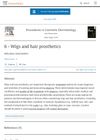 September 2023 in “Nature Communications”
September 2023 in “Nature Communications” Immune cells are essential for skin regeneration using biomaterial scaffolds.
 August 2023 in “International Journal of Molecular Sciences”
August 2023 in “International Journal of Molecular Sciences” The new hydrogel with zinc and polysaccharides improves wound healing and has antibacterial properties.

Plant-based compounds can improve wound dressings and skin medication delivery.
[object Object]  July 2023 in “International Journal of Endocrinology”
July 2023 in “International Journal of Endocrinology” Centratherum anthelminticum seed extract effectively treats Polycystic Ovary Syndrome in rats.
 May 2023 in “Journal of Ethnopharmacology”
May 2023 in “Journal of Ethnopharmacology” The wild garlic plant, Allium macrostemon Bunge, can promote hair growth and could potentially be used to treat hair loss.
IVL-DrugFluidic® can mass-produce high-quality, long-acting injectable drug microspheres, improving patient compliance and reducing side effects.
 February 2023 in “Laboratory Animal Research”
February 2023 in “Laboratory Animal Research” Cudrania tricuspidata and Sargassum fusiforme extracts improved hair growth in mice by affecting growth-related genes.
[object Object]  October 2022 in “Legume Research”
October 2022 in “Legume Research” The research found a way to grow plant tissue and analyze compounds in Bituminaria bituminosa, which is promising for hair restoration treatments.
 June 2022 in “Pflügers Archiv - European Journal of Physiology”
June 2022 in “Pflügers Archiv - European Journal of Physiology” The enzyme sEH is important for hair growth and its inhibition could help treat hair loss.
 January 2022 in “Plastic and Aesthetic Research”
January 2022 in “Plastic and Aesthetic Research” Choose the simplest, most fitting scalp reconstruction method for each patient's unique needs.

Justicia procumbens extract may help prevent hair loss and improve hair thickness and shine in a type of hair loss condition.
February 2023 in “Medicine in novel technology and devices” Microneedles with traditional Chinese medicine can help regrow hair in androgenic alopecia.
February 2023 in “Frontiers in Pharmacology” Water extract of Cacumen Platycladi helps hair growth by activating specific cell pathways.
January 2023 in “Pharmaceutics” AA–TF#15 significantly promotes hair regrowth and could be an effective treatment for androgenic alopecia.
October 2022 in “Frontiers in Bioengineering and Biotechnology” Bioengineered nanoparticles can effectively treat hair loss by targeting specific enzymes and receptors.
Sansevieria trifasciata Prain shows promise for treating hair loss by inhibiting androgen receptors.
 May 2023 in “Elsevier eBooks”
May 2023 in “Elsevier eBooks” Wigs and hair prosthetics boost confidence and quality of life for people with hair loss.
 19 citations,
May 1991 in “Journal of Chromatography B: Biomedical Sciences and Applications”
19 citations,
May 1991 in “Journal of Chromatography B: Biomedical Sciences and Applications” Reliable method detects finasteride in human plasma at low doses.
1 citations,
June 2023 in “Journal of Patchouli and Essential Oil Products” Patchouli essential oil may help reduce eczema symptoms in infants and toddlers.
 February 2023 in “Molecules”
February 2023 in “Molecules” Cactus extract from Notocactus ottonis may help promote hair growth.
 36 citations,
September 2019 in “Journal of Herbal Medicine”
36 citations,
September 2019 in “Journal of Herbal Medicine” Herbal nano-formulations show potential for effective skin delivery but need more research.
 117 citations,
March 2017 in “Nature Communications”
117 citations,
March 2017 in “Nature Communications” Macrophages help regrow hair by activating stem cells using AKT/β-catenin and TNF.
 42 citations,
March 2014 in “European Journal of Pharmacology”
42 citations,
March 2014 in “European Journal of Pharmacology” Ginsenoside F2 from ginseng may increase hair growth better than standard treatments by affecting cell growth signals.
 36 citations,
January 2019 in “Nature communications”
36 citations,
January 2019 in “Nature communications” High lactate dehydrogenase activity is not necessary for the growth of squamous cell carcinoma.
 26 citations,
December 2020 in “Nature metabolism”
26 citations,
December 2020 in “Nature metabolism” Rapamycin treatment helps with mitochondrial disease by reducing PKC levels.
 12 citations,
May 2014 in “International Journal of Molecular Medicine”
12 citations,
May 2014 in “International Journal of Molecular Medicine” Chrysanthemum zawadskii extract helps hair grow by stimulating hair cells.
 5 citations,
February 2019 in “bioRxiv (Cold Spring Harbor Laboratory)”
5 citations,
February 2019 in “bioRxiv (Cold Spring Harbor Laboratory)” Rapamycin may help treat Leigh syndrome by targeting protein kinase C.
 3 citations,
January 2019 in “Jikken doubutsu ihou/Jikken doubutsu/Experimental animals/Jikken Dobutsu”
3 citations,
January 2019 in “Jikken doubutsu ihou/Jikken doubutsu/Experimental animals/Jikken Dobutsu” Pigs without the Hairless gene showed skin and thymus changes, useful for studying human hair disorders.
 2 citations,
April 2017 in “Molecular Medicine Reports”
2 citations,
April 2017 in “Molecular Medicine Reports” Blocking autophagy increases survival of inner ear hair cells exposed to gentamicin.
 1 citations,
February 2014 in “Archiv Der Pharmazie”
1 citations,
February 2014 in “Archiv Der Pharmazie” Carbamates may help treat androgen-dependent conditions by changing how certain lipid enzymes are produced.























